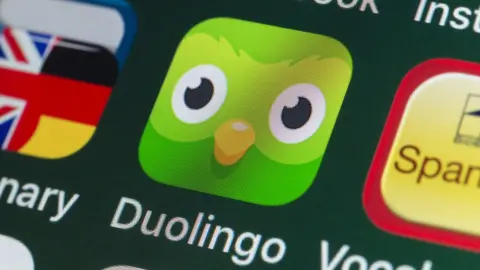Learning Welsh: Language app sees rise in interest
 Getty Images
Getty ImagesThe number of users learning Welsh on one language app has risen by a third in just a year.
Duolingo said about 38,600 people in the UK used its Welsh course in September, a 34% rise on 28,600 users in the same period in 2018.
Another online tool, Say Something in Welsh, estimated it has up to 60,000 regular users of its website.
The Welsh Language Commissioner said the apps "offer an alternative way of learning the language".
The Welsh Government aims to get one million people speaking Welsh by 2050.
Anecdotal evidence has also suggested more and more people are using Duolingo outside of the UK.
Learning in Germany
Silke Muller, from the Bavarian town of Landshut, about an hour north of Munich, has no Welsh heritage.
But last year she completed a GCSE in Welsh, two years after starting to learn the language on an app.
"I started with Duolingo because at first I thought I could just do it on my own, so I thought I would give this a try and do it without a teacher," she said.
"I definitely found it useful for various reasons. The repetition gives you a way of getting words and vocabulary in your mind and helping it stick there.
"Some of them are written in such a fun way so you won't forget them.
"I finished the whole course after about two years, I'm now using it just to revise and remind myself of different patterns, so I don't forget the vocabulary."
Despite her progress with the app, Ms Muller started getting lessons from a teacher online for "interaction" and "to have someone to ask questions".
 Getty Images
Getty ImagesShe travelled to Wales - and the national Eisteddfod - in order to practise the language.
"People were so happy to know that their language is of interest to those in the world and it's not just people in Wales," she said.
"In the beginning it's good to get over that fear of using a different language, but people are really welcoming and are really happy to have you using the language.
"It actually went amazingly well."
'Useful tool'
Duolingo launched its Welsh course in 2016 and has been accessed by 1.2 million people since.
Richard Morse, from Cwmbran, in Torfaen, helped write the course as a volunteer, and said some schools now use the app.
"It's very effective, it's a good, interesting way to learn something," he said.
"You would have to do self-study and you really need some way of talking to someone."
Mr Morse added the Welsh course does not have "the same level of sophistication" so users cannot speak Welsh into it.
But he said it was "a fantastic tool if you're using other ways of learning".
'Offering opportunities'
Colin Watkins, Duolingo's UK manager, said: "Our goal is to encourage people to love learning a language."
He added September was normally a quieter month, as they see more activity for languages such as Welsh in the winter.
The Welsh Government's aim to get one million people speaking Welsh by 2050 was announced in 2016.
Aled Roberts, the Welsh Language Commissioner, said since then he had "travelled the length and breadth of Wales" speaking to people about their use of the language.
He said he had heard of the benefits of Welsh lessons offered by employers, evening classes and residential classes, but he also knew of the "great" apps available, which "offer an alternative way of learning the language, to fit within busy schedules".
Mr Roberts added "the most important thing is offering opportunities for people to learn the language".
